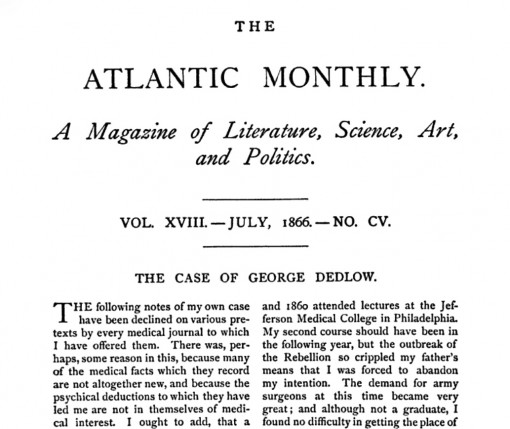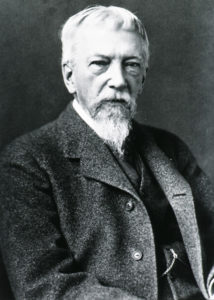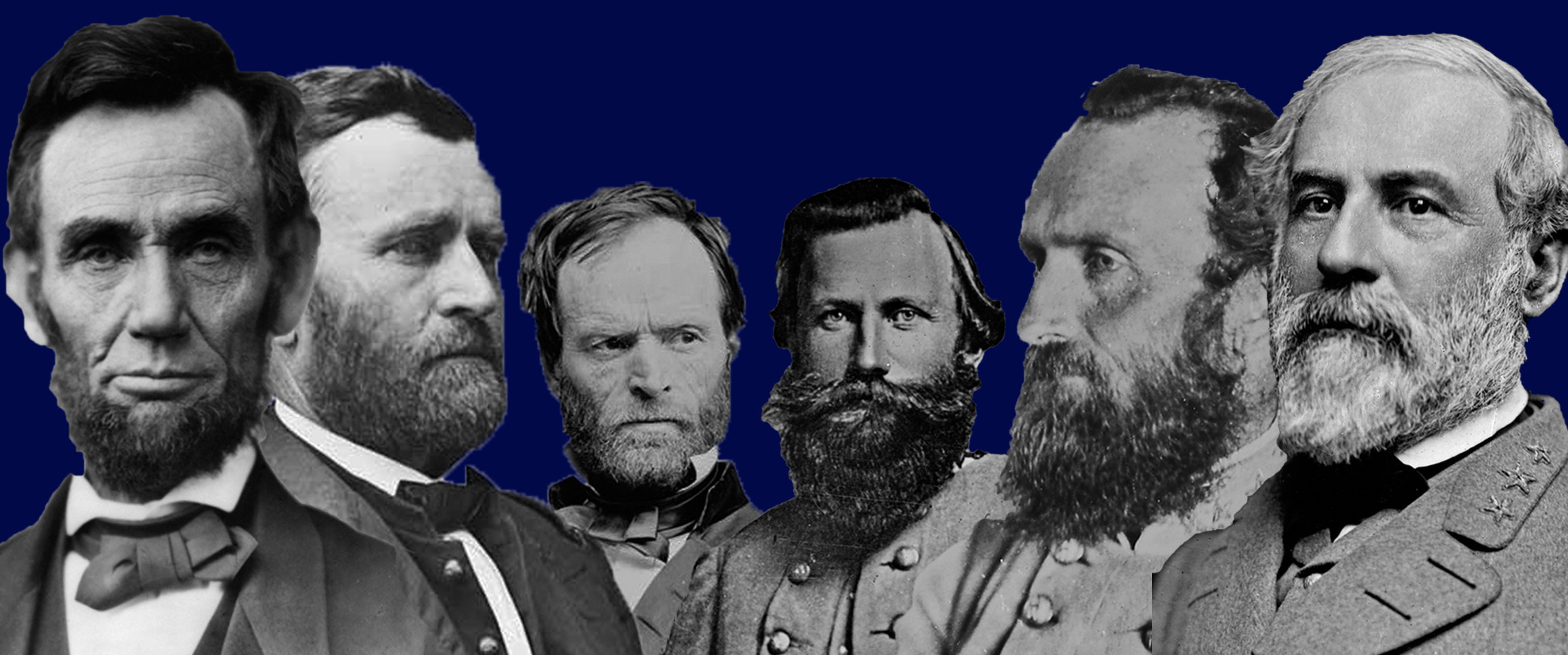 In July 1866, The Atlantic Monthly magazine published a lead article titled “The Case of George Dedlow.” Although the author was anonymous, it appeared to be an autobiographical narrative of a physician who had served in the Union Army as an assistant surgeon with 79th Indiana Regiment near Nashville, Tennessee.
In July 1866, The Atlantic Monthly magazine published a lead article titled “The Case of George Dedlow.” Although the author was anonymous, it appeared to be an autobiographical narrative of a physician who had served in the Union Army as an assistant surgeon with 79th Indiana Regiment near Nashville, Tennessee.
Dedlow began the story by recounting how he was wounded by Rebel guerrillas while on a mission to obtain much needed medical supplies from a nearby unit. Captured after receiving a gunshot wound through both upper arms, Dedlow was taken to a Confederate hospital where he underwent amputation of his right arm below the shoulder. Although the left arm was spared amputation at the time, he was left with a chronic suppurative, or pus-producing, wound in the extremity.
After serving months in a Confederate prison, Dedlow was exchanged in August 1863 and returned to duty with his regiment at the Battle of Chickamauga. Severely wounded again, this time in both thighs by cannon fire, Dedlow would undergo bilateral below-the-hip leg amputations. Upon awakening from anesthesia, Dedlow had the sensation of pain in both legs and cramping in his left calf. After asking an attendant to rub his calf, he was shocked to find that his legs had been amputated.
Unfortunately for Dedlow, his plight only worsened. While recovering in a Nashville hospital, an outbreak of hospital gangrene struck the ward in which he was recuperating. As the infection spread among patients, it “seized” upon the suppurating wound in his left arm. With no other hope of recovery, Dedlow had to have his only remaining limb amputated at the shoulder joint. He awoke from surgery to find himself “a useless torso.”
The article then describes, in much detail, Dedlow’s persistent ordeal with pain and sensations in his absent limbs, in addition to documenting similar complaints of other amputees in the hospital. The story ends with Dedlow discussing his psychological difficulties in dealing with his situation along with a bizarre event of a medium who supposedly contacts his missing legs in the spirit world.
Many readers were so moved by the story that some sought to obtain monetary collections to aid the unfortunate George Dedlow, while other benevolent individuals travelled to Philadelphia to personally offer help. The only problem was that George Dedlow did not exist. The entire account was a work of fiction by S. Weir Mitchell, M.D.

National Library of Medicine
Silas Weir Mitchell was a Philadelphia native and physician who specialized in disorders of the nervous system. As a widower tasked with raising a family, he did not enlist in military service at the outbreak of the Civil War, but instead worked as a contract surgeon for the U.S. Army. Based on his knowledge and experience, he was placed in charge of Turner’s Lane Military Hospital in Philadelphia, which became a specialty hospital for soldiers with neurological diseases.
His position at Turner’s Lane Hospital allowed Mitchell to study and treat soldiers with a condition he called “sensory hallucinations” of stumps, commonly known as “phantom limb syndrome.” Although first described as early as the 16th century by French surgeon Ambroise Paré, Mitchell was the first to study and describe the phenomena in detail, writing in his 1872 textbook, Injuries of Nerves and Their Consequences:
“Nearly every man who loses a limb carries about with him a constant or inconstant phantom of the missing member, a sensory ghost of that much of himself, and sometimes a most inconvenient presence, faintly felt at times, but ready to be called up to his perception by a blow, a touch, or a change of wind.”
The term “phantom limb syndrome” became popular from an earlier article Mitchell wrote in December 1871 for Lippincott’s Monthly Magazine titled “Phantom Limbs,” in which he describes the condition at length for a more general audience:
As a rule, the leg is less vividly present than the arm, and is thought to hang down straight, there being uncertainty after hip-amputation as to whether it swings or not in walking with a crutch. It hardly ever seems bent, while in arm-cases of loss above the elbow the limb is felt nearly always as if bent at the elbow, the hand lying in front of, close to or off the chest in the air; and this position is still insisted upon as existing even when there is no distinct notion of flexion at the elbow. The hand is open or half open in some; in others it is a shut fist.
In his textbook, Mitchell relates that individuals often feel as if the phantom limb is also shortened as “the foot or the hand, as the case may be, is felt nearer to the trunk than the extremity of the other limb.” The sensation of the missing limb is often experienced “as soon as they come from under the influence of anesthetic used at the time of amputation, but in others it only arises after they cease to suffer pain, rarely delayed beyond three weeks.” In time, he writes “if not reminded by pain or other subjective symptom, the patient is apt to lose sense of the presence of the part, and this, I think, is most liable to occur as regards the leg.”
Through his investigations and medical writings, Mitchell became the leading authority not only on “phantom limb syndrome,” but on most neurological disorders and today is considered one of the fathers of American neurology.
Besides medicine, Mitchell had a keen interest in poetry and writing and would subsequently publish several novels, many of which contain characters with various medical conditions. In 1900, Mitchell wrote that he never intended his first literary work, “The Case of George Dedlow,” to appear in print. He lent the manuscript to a friend who, without his knowledge, sent it to the editor of The Atlantic Monthly, who then printed it as a leading article without using his name.
S. Weir Mitchell, physician, scientist, poet, and novelist, would die of influenza in 1914 at the age of eighty-four.
Suggested reading:
Mitchell, S. Weir. “Neural Maladies of Stumps.” Injuries of Nerves and Their Consequences. Philadelphia: J.B. Lippincott & Co., 1872.
Canale, D.J. “Civil War Medicine from the Perspective of S. Weir Mitchell’s ‘The Case of George Dedlow.’” Journal of the History of the Neurosciences 11, no. 1 (2002): 11-18.







Leave a Reply